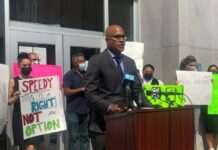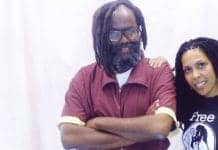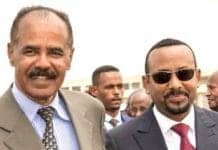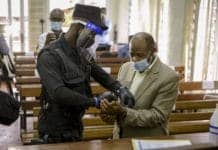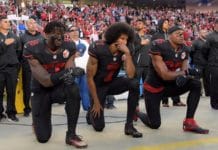by Ann Garrison
KPFA Weekend News broadcast Dec. 28, 2014
Rwanda and Uganda are threatening a cross-border war of aggression in Congo against the armed refugee militia, the FDLR, unless its members surrender and disarm by a U.N. deadline, Jan. 2. They do not have a U.N. mandate to cross the border as they did in January 2009.
Transcript

KPFA Weekend News Anchor David Rosenberg: Rwanda and Uganda are threatening to send troops across their borders with the Democratic Republic of the Congo yet again to, they say, eliminate the Hutu refugee militia known as the Democratic Forces for the Liberation of Rwanda, or FDLR. Going after the Hutu refugee militia has been Rwanda and Uganda’s excuse for crossing into Congo for the past 18 years, since the outset of the First Congo War in 1996.
During those years, Rwanda and Uganda have driven one Congolese president into exile, assassinated another, started wars which left millions of Congolese people and Rwandan refugees dead, and developed an international criminal network for smuggling illegally extracted minerals and timber resources out of Congo. KPFA’s Ann Garrison spoke to Felicien Kanyamibwa, president of the National Democratic Coalition, which released a statement opposing military action against Rwandan refugees in the Democratic Republic of Congo.
KPFA/Ann Garrison: Felicien Kanyamibwa said that, first of all, there are not only Rwandan Hutu refugees but also Rwandan Tutsi refugees in eastern Congo’s Kivu Provinces. Both have fled to eastern Congo to escape the repressive Rwandan government of Paul Kagame, and his coalition includes Tutsis who were once part of Kagame’s party. However, Kagame doesn’t like to talk about the Rwandan Tutsi refugees because that would negate and expose his 18-year excuse for crossing the border – hunting Hutus practicing “genocide ideology.”
Felicien Kanyamibwa: The problem really is that in Rwanda, there is a repressive regime that does not give guarantees to Hutu refugees, or even Tutsi refugees, to go back to Rwanda. That’s the major problem and that’s why those refugees stay in Congo.
KPFA: Kanyamibwa said that Kagame’s real motive for crossing the border into Congo yet again is to seize the resources and territory of the Kivu Provinces, which he believes to belong to Rwanda because the Rwandan Tutsi monarchy controlled them prior to the Berlin conference of 1884-85, which redrew African borders to create European colonies. The Organization of African Unity voted, in 1964, not to try to restore the precolonial borders of Africa after these colonies won their independence, but Kagame seeks to reclaim the Kivu Provinces nevertheless.
Kanyamibwa: The president at some point said, “Rwanda used to be bigger than what it is right now.”

KPFA: They want to annex the Kivus. They believe the Kivus belong to Rwanda?
Kanyamibwa: Yeah, Rwanda says that. At some point the Rwandan government was saying, “Actually Rwanda used to be bigger than what it is. Eastern Congo used to be under Rwandan influence before the colonization by Belgium. Then, it should come back to Rwanda.”
KPFA: Well, that’s what the ENOUGH Project seems to want to encourage, just like it encouraged the split of the Sudans, yanking South Sudan off of Sudan.
Kanyamibwa: Yeah, and in eastern Congo, there are almost 500,000 Tutsi. The majority of them came from Rwanda. So all those M23, all those guys, they may say, “You know, the federal government does not serve our interests; the government of Congo in Kinshasa does not serve our interests. We want to secede, like South Sudan,” as you said.
KPFA: The governments of Tanzania and South Africa and, not surprisingly, the government of the Democratic Republic of the Congo, are all opposed to another Rwandan and Ugandan offensive inside Congo’s borders. Since Tanzania and South Africa are the primary troop contributors to the U.N. Force Intervention Brigade, it cannot be mobilized against the refugee militias and neither can the Congolese Army.
Kanyamibwa said that a Rwandan Ugandan offensive across Congo’s borders would also violate the U.N. Security Council mandate, which named a date – Jan. 2 – for action by U.N. and Congolese forces, not a cross-border war of aggression.
Kanyamibwa: The mandate to launch operations on Jan. 2 was given to MONUSCO, which is the U.N. Peacekeeping Mission in eastern Congo. If Rwanda and Uganda cross the border, it’s beyond the mandate given by the U.N. Security Council. They may do that, but I don’t see that if South Africa, Tanzania and DRC don’t agree to that crossing of the border.
KPFA: And they don’t agree, right?

Kanyamibwa: To my knowledge, they don’t agree, and they want a peaceful solution to the problem of Rwandan refugees in eastern Congo.
KPFA: Kanyamibwa also said that President Obama has enormous power to stop Rwanda and Uganda from starting another cross-border war of aggression.
Kanyamibwa: The good thing about President Obama is he has clearly stated that he’s not supporting dictators. He’s supporting strong institutions, not strong men. And in the case of M23, he clearly showed that by suspending the aid to Kagame, he showed that he can do something that is going to change the situation. Even now he can decide to suspend aid to Kagame and things are going to happen.
KPFA: OK, you think if he suspended aid or threatened sanctions, or did impose sanctions, there would be no military mobilization against these refugee groups in eastern Congo?
Kanyamibwa: Absolutely, and if there is a power, a world power, that Kagame’s afraid of and he’s ready to listen to, it’s the United States. If they tell him to do something today, I don’t think he’s going to ignore that. I know it’s a sovereign country, Rwanda, but it’s a Rwanda that depends on international aid.
KPFA: For Pacifica, KPFA, and AfrobeatRadio, I’m Ann Garrison.
KPFA/David Rosenberg: Statements by the FDLR and the Rwandan National Democratic Coalition have been posted to the San Francisco Bay View website. That’s at sfbayview.com.
Oakland writer Ann Garrison writes for the San Francisco Bay View, Black Agenda Report, Black Star News, Counterpunch, Colored Opinions and her own website, Ann Garrison, and produces for AfrobeatRadio on WBAI-NYC, KPFA Evening News, KPFA Flashpoints and for her own YouTube Channel, AnnieGetYourGang. She can be reached at ann@afrobeatradio.com. In March 2014 she was awarded the Victoire Ingabire Umuhoza Democracy and Peace Prize for promoting peace in the Great Lakes Region of Africa through her reporting.

 Store
Store



